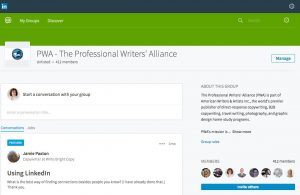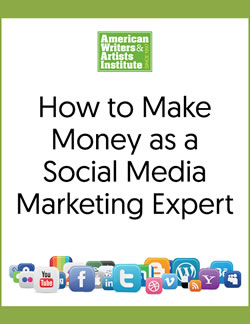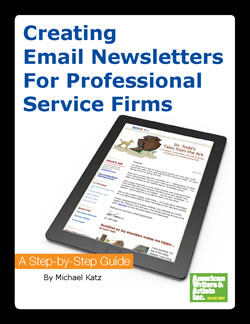The Retainer Approach to Landing Well-Paid Freelance Writing Jobs


By Katie Yeakle and Rebecca Matter for PWA (Professional Writers’ Alliance)
What would it mean to your writing career if you could land retainer agreements that ensure predictable income each month?
It would certainly make the move from full-time job to thriving freelancer much easier — and safer.

Katie Yeakle and Rebecca Matter, from AWAI (American Writers & Artists Inc.)*, reveal what you need to know about retainer deals for copywriters — how they work, why they’re great, and how to land them.
Seven reasons why freelance writing retainers rock — and they do rock.
1) It’s easier to forecast your income.
If you’re transitioning from full-time to the freelance life, you need to have steady income.
- You’ve got a job right now where you’re making a set amount of money.
- You have bills coming in that you have to pay.
With retainers, you can forecast how much money is coming in every month, which makes freelancing a lot less stressful and a lot easier.
When you’re looking to jump from a full-time job to the freelance life…
think about how much money you actually need to make before you leave your job. (Play the video to hear Rebecca explain why.)
Before we continue, let’s answer a burning question you may have:
What are freelance writing retainers?
Retainers are “set” projects you can count on every single month.
Every month, I expect so much copy from you. And every month, you expect so much money from me as your client. So it’s very nice.
It could be something along the lines of, “I agree to write 4 blog posts a month at $XXX.XX per post for the next 12 months.”
You can have multiple retainer deals. And you really only need a few in order to have a steady foundation of income month after month.
2. Retainers give you peace of mind.
You don’t have to wonder where your next project is coming from because you already know. You have this steady project that happens every single month.
3. Retainers give you an increased per-hour rate …
…(even though we never recommend quoting a per-hour price to your clients).
As you get better, faster, stronger, the money you’re making per hour tends to go up because you become more efficient. You become more effective. Let’s explain:
The more you work on retainer deals for a client, the better you get because you know their audience better, you know the company better, you know their copy style better, you know what works better.
You start spending less time on that client’s projects. So your per-hour rate actually ends up increasing because you’re able to do the job more efficiently.

4. Better results for your clients, a better track record for you.
Because you’re working so closely with your clients and you're understanding their prospects and their business, of course you're just going to do better than the average freelancer who comes in and does one project and then leaves.
Month after month, you’re learning. You’re learning about their customers and what they're interested in and what their hot buttons are. As a result, your clients are going to get better results. And that means you’re going to have a better track record.
When you go to land other clients or take on other projects, you can say, "Hey, this is what I've done for Client A. This is what I've done for Client B." It’s such a great way to promote yourself and land other deals as well as one-off projects.
5. You’ll spend more time making money and less time marketing yourself.
That's because you've got a steady gig. You only have so many hours in a day you’re going to be working. And once you fill up those hours, you really can't take on any other clients unless you either give up something or let one go so you can hire a better client. And that's a whole other conversation and something that will happen to you naturally.
As you pursue copywriting and become a professional writer, you will outgrow clients. But that's for another day. But you get to spend less time marketing because you don’t have to fill your project list every month because you have a set amount every single month you can expect, which means you'll spend more time making money because you'll be working on projects every month.
6. You'll get increased referrals.
 This just goes with relationships. So where you work with clients, again, the better you start doing just because you know their stuff better. The happier they are, the more likely they are to refer you.
This just goes with relationships. So where you work with clients, again, the better you start doing just because you know their stuff better. The happier they are, the more likely they are to refer you.
The people I refer most — just because I know them so well and because I work with them so much — are my retainer freelancers. And that's just because I've seen them work so much. It's not just on one project. I've seen them work month after month, so I have a lot more experience working with them. And so, it’s a great way to get referrals from your clients.
7. You’ll increase your value to your clients.
As a freelancer, when working month to month and learning the client’s business and marketing, you just bring so much more value to the table.
This last one is the most exciting, because as a retainer freelancer, you are talking to the customers. You’re working on a regular basis with them. You know where the opportunities lie in the business.
That means along with doing a great job on the retainer projects, you’re going to be put in a position to help even more: "Hey, Client A, I've been working on social media. I think you really need to do an article series on this topic." Or "Hey, your customers over here are talking about this. Have you thought about doing a sales letter about ABC?" Or "I thought of a great new email strategy after listening to the people over in social media or after looking at the responses to this e-newsletter. I think it would be great if we do an email sequence that looked like this." You provide WAY more value to your client!
While the retainer gives you loads of benefits, it benefits your client, too.
Here’s why clients love retainer agreements.
1. Reduced time hiring a qualified copywriter.
If I set up a retainer with you as a freelance writer, I don’t have to hire new copywriters every single month for every single project because I already know you're great. That's why I have you on retainer. And so when I have another project, I just call you. I get to save a lot of my time hiring copywriters.
Hiring good copywriters is a HUGE challenge for marketers.
(Play the video to find out why, and how you can help.)
2. For the client, there's a shorter prep time for projects.
When I give you a project because you know my prospect, because you know who we are, and what our products are, and you’re very familiar, I don’t have to spend a lot of time what we call “onboarding” you to get you up to speed on things. You already know. So I can just send off the work.
With my retainer people, I can just send them something and say, "Hey, I need a sales letter on this or I need an e-letter on that." And they may have questions they'll ask, but I don’t have to fill them in on everything else about our style and our voice and the tone and things like that. They already know. So it’s better for the marketers for that reason too.
3. Better copy in the long run.
I get better copy as the client in the long run because you know all of the stuff and you've been working with us.
4. Better results, thanks to your ongoing work.
And we get better results. So the retainer is a true win-win. It’s great for you and it is great for me as the client.
The best three retainer deals for well-paid freelance writing jobs.
We call them the best because they’re easy to start with, you can command very good fees, and they open the door to other projects.
1. Social Media
If you’re looking to make the leap from full-time job to freelance career, social media projects will make transition super easy for you because you’re not going to need that many of them.
The reason companies are on social media is to attract and engage new prospects. But they don’t have time or perhaps even the right skills to keep up!
Here’s what Rebecca had to say about your role — and opportunity — as a social media copywriter and account manager:
(Play the video to get details.)
The fees for managing social media are upwards of $2,000 a month, depending on how much you do.
Just managing a couple of Facebook accounts and maybe a Twitter account for one client could easily get you $2,000 a month. And it would be very reasonable for you to take on four or five social media clients.
So you can see just how easily you can transition from the full-time life to the freelance life just with social media.
And then, new content and other things are often priced separately. So your client will give you $2,000 a month, but they may be worth a whole lot more in the end because of all the other projects you can ultimately add on as you learn new skills and how to do different projects.
How do you land a social media retainer deal?
 The best way to start is to get involved in those social networks. Identify five clients. Everybody can do this today.
The best way to start is to get involved in those social networks. Identify five clients. Everybody can do this today.
Identify five clients in your niche that you really want to write for. If you don’t know what niche is, that basically means choosing an industry or a certain type of company you want to write for.
So, let's say the “mommy” market, or the writing community, or solar technology companies. Follow these five steps to get involved:
- Identify five social networks and get involved. Start commenting. Start engaging. Just be present and let them see that you’re engaged and you’re what we call the superstar participant. We're constantly watching. At any given time, I know who my three best community members are in any one of our communities. So get involved. That's huge as far as landing social media.
- Identify how the clients are using each social media site. Are they using it to attract and engage new prospects? Are they using it to turn followers into buyers? Or are they using it to service their current customers? Or are they using it to do all of those things? But identify how they're using them because that will help structure your message.
- Research and join similar groups. So you’ve got the main five you're part of. But in becoming part of their community, you’re going to learn members and social media people are very open to sharing information about where they are and the world they participate in.
- Get involved in similar groups, especially on LinkedIn and even on Facebook. Then you can see what prospects are talking about there, too.
- Finally, look for additional opportunities. Are they posting things? Let's say they're only servicing customers, but they're not actually trying to attract anybody. Well, hey, there's your in. “You're only doing this for servicing. I'd love to help you actually bring people to your page.” Or, “I see you're bringing people to your page. But you’re not really engaging with your social media followers. Let me help you engage.”
 Any time you can come in with an opportunity to a marketer, they're going to listen (if they’re smart). And then you basically go in and say, "It seems like your goals are X, Y, and Z. I'd like to propose A, B, and C." Be very specific and show them you've taken the time to pay attention to what they're doing.
Any time you can come in with an opportunity to a marketer, they're going to listen (if they’re smart). And then you basically go in and say, "It seems like your goals are X, Y, and Z. I'd like to propose A, B, and C." Be very specific and show them you've taken the time to pay attention to what they're doing.
To learn more about being a Social Media copywriter, AWAI offers the program, How to Make Money as a Social Media Marketing Expert. Its program developer, Nick Usborne, guides you through the changing social media landscape, showing you exactly how you can use social media to position and grow your freelance business and the steps you can take to give your income a healthy boost by offering these services to your clients.
2. E-newsletters
The goal of a company sending out an e-newsletter is threefold:
- Position the company as the expert. So they have to constantly demonstrate their expertise.
- Turn prospects (people who are just in there looking at their content) into customers.
- Turn customers into repeat buyers to buy other stuff.
It’s not a very easy task for companies because they have a lot of things they're trying to accomplish in one message.
They're covering three different purposes at any given time. And that's why writers are necessary, especially in the smaller professional businesses.
Let’s look at why every business needs an e-newsletter copywriter, why it’s such a great retainer project, and your role.
(Play the video for insights from Rebecca.)
Typically for an e-newsletter, you can charge about $900 to $2,000 per issue.
The length is typically 1,200 to 1,500 words.
- If you’re writing an e-newsletter for the veterinarian every single month, this is about the rate you’re going to expect to write and send an e-newsletter issue.
- Now, if you’re working with a business that does not have an e-newsletter and they need you to create the focus of the e-newsletter from scratch, you’re not just stepping in and taking over an existing publication. In other words, you’re actually creating it. Then you can charge an additional fee — there would be multiple thousands in that first month just to set up and develop the e-newsletter.
And then, you can literally have five clients, charging up to $2,000 for each, per month. Not a bad living just on e-newsletters.
So how do you manage an e-newsletter retainer deal?
- Focus on a particular niche. If you pick a niche and say I'm a veterinary newsletter writer, I'm a chiropractor newsletter writer, whatever it is, start there.It will make your life so easy, plus you'll be an expert in that space. Who else are they going to hire to write their veterinarian’s newsletter than the guy who writes veterinary newsletters? That's what you do. That's your specialty.
- Review other newsletters in the industry. What are other people are talking about? What are they covering? It makes it very easy to figure out what the hot topics are.
-
Put together a few sample issues. If you’re going to be the martial arts newsletter writer, put together three sample issues of awesome martial arts newsletters and just make up a company name. It doesn’t matter.
IMPORTANT: A note about samples. All clients are looking for when they ask you for samples is truly just a sample of your writing. They're not looking because you work for Company ABC or because you have this high-profile client. Don’t worry about that. They just want to see. If you’re the martial arts newsletter writer, show me three samples of a martial arts newsletter and I will be able to judge because that's my area of expertise whether I think that newsletter will resonate with my customers. That's it.
- Prepare two proposal templates. I like templates because it makes it very easy when the client says, "Hey, I am interested. So send me a proposal." You think, “Well, great. I already have it all written out. I just have to fill in the company name and customize it just a little bit."One template is for taking over an existing e-newsletter. Something they already have in place.The second one is for starting a new e-newsletter. If the company doesn’t have any newsletter, there's more work to help them establish their voice and create the e-newsletter copy style, overall direction, and even a topics calendar.
 If you’re just starting out, go after the ones who already have an existing newsletter. It will be easier for you.
If you’re just starting out, go after the ones who already have an existing newsletter. It will be easier for you.
You may also want to check out an AWAI program by Michael Katz, Creating Email Newsletters for Professional Services Firms. It will help you learn how to set up a new e-newsletter and how to pitch them so you present that opportunity very well to the client and improve your chances of them saying yes.
3. Online content
This is probably one of the most misunderstood forms of writing out there today… and you can help clients understand how it works and why it’s powerful.
Most companies and writers think the purpose of online content is to impress their reader and to prove their authority, which of course happens as an aside, anyways. But that is never your intention as a writer when writing online content.
The real purpose is bigger. It’s way bigger than that. It’s to attract prospects to the business.
It’s to put content out there that is relevant to the people who you’re trying to bring into your business, not anyone out there who's just looking in the fence, "Hey, I'm interested in this topic." We're trying to find the people who genuinely are a fit for the business, people who are genuinely going to buy our products and services.
That's the main purpose of online content. It’s to attract the right people into reading it.
Now, let’s listen to what Rebecca has to say about the second and third purposes of online content.
(Play video to hear why online content is so valuable.)
Online content writers are super valuable.
Just by listening to this presentation, you already know 90% more than some "online content writers" just because now you understand the importance of online content and its real purpose.
For your fees, we're looking at $100 to $500 per piece (article, blog post). This is your traditional online content, the stuff you and I read on a daily basis, the 800 to 2,000-word pages that, again, bring people in, connect them to the brand, engage them, and nurture those relationships.
You can charge even more, especially if you’re in a Business-to-Business (B2B) space and you’re writing about something that's very specific. For instance… you may be writing about some kind of widget or this new solar technology function or the way this drug affects the body in pharmaceutical.
When presenting your value to the client, you can say, “I understand the real purpose of online content. It’s to attract your prospect. It's to engage your readers, nurture the relationship, and prepare them for the sale.” You're already going to sell so much value right there just from that alone.
How do you land online content retainer deals?
Very similar to social media, get involved.
- Read content on websites of interest.
- Go look at the companies you want to work for.
- Go look at other companies in that industry and read their content. What are they writing about?
-
Determine who their audience is and what they're ultimately trying to say. Also, what are they trying to sell me? Because ultimately they're setting you up for something. They're identifying a problem. They're selling you a dream that you have or a goal. And they are providing you with a solution. They are the solution.
Caution: You don’t want to write for companies who aren't selling anything because that means they have no money to give you. So you want to write for companies who are selling something.
- Put together a list of relevant topics for the client. Hey, [Client], have you ever thought about writing your article content on [topic]?" Or "I've come up with three ideas I think your audience would love to hear."
- Then just offer your ideas in the body of the email. I'm going to open that email every time. I'm going to know it’s a custom email, that you didn’t send it to a hundred other companies because it's specific to me. And immediately you’ve demonstrated your value to me by showing me you know my audience and that you know what they're interested in.
Q&A: Answers to four main questions about the retainer approach to landing well-paid freelance writing jobs
Q: How do I talk with companies about retainer deals (and which companies use them)?
A: Every company needs help with keeping in touch and building the relationship via social media, e-newsletters, and content. These are the tools of the trade.
And it’s something that business owners don’t really have the time necessary or the skill or the expertise to do themselves. And they are happy to bring somebody in to help them do that.
With everything you do as a copywriter, you are solving problems. You are helping people be more successful. And that's part of this whole best practice too is owning and embracing that and starting from there. “Let's do this together. Let's get this done. Let's make you more successful.” That's the approach.
You offer valuable services that these people need.
IMPORTANT: When thinking about the income potential for you, keep in mind that a small yoga studio that could be great for you to get started with isn't going to have the same kind of volume or budget or need as one of Agora's newsletter publishing divisions where the sky is really the limit.
Part of your homework, as you’re checking out niches and finding the companies you want to work with, is really understanding what their needs are and what their potential growth is. The size of their market is, what they're doing now, and how you can add to that and help them build.
Most people aren't comfortable going from 0 to 60 at once. They want to take baby steps. And I think that's a good way to look at this as well too. But first of all, you wanted to see where they are on the playing field. And then also what is it that they’re doing on a regular basis? The big thing about retainers is there's regularity to them. Typically, these are things that companies need every month. They just want it to be like clockwork.
And with any kind of client, you want to make sure that this is a product or service you’re excited about and that you believe in.
You're creating your dream work environment, your work situation, as part of your life. You get to call the shots. So there's no reason to work for people that you might not be a fit with personality-wise or any other way.
Q: What if I find a small company or a client with a small budget? Is it worth it?
A: There's no retainer deal that's too small. There's always room. Once you get in, establish yourself, and do a great job, 99.9% of the time you’ll experience growth.
For instance, a small business owner may have a very small budget. She can only afford less than $500 a month. But as soon as she gets somebody in there, doing what she needs to, by six months from now, I'm sure the person will be seeing enough results, and she’ll happily pay $1,000 a month. But she's got to get to her comfort level and the relationship has been built.
Don’t be too concerned or put off if, at the start, it is something small to get started. It’s great to have a steady paycheck. It’s great to know what you’re going to be doing on the third Thursday of every month, however that works out. It’s a place to start and it’s a place to grow.
And, once you’re the social media person for a company (for instance), there will be so many opportunities for you to bring other projects, other ideas, and other things outside of your retainer deal to the table.
During this growth period, you definitely want to check in with the client. I wouldn’t do it every month, but every couple of months, every six months, and definitely once a year. Check in with the client and say, "Hey, is everything good, everything up to standard? Are you happy with this?"
Check in with yourself as well. There are two people in this relationship. And so make sure it’s working for you. And then think, okay. How can we make this better? How can we make this more? What more do I bring to the table? Is this just great?
Once you get involved, once you get to be part of the fabric of how their company works, and part of the conversation they're having with their customers, you’re going to know their products and services on a very deep level.
You’re going to be able to step in and intervene and prevent and be proactive as far as opportunities go and help them solve problems and avert problems. You’re going to know the audience. You’re going to be part of them. You’re going to be part of that community. And you’re going to understand the mechanism behind-the-scenes. And that's very important.
Q: How do I make sure the client is getting what he/she wants from the retainer work?
A: Oh, this is important too. There are two sides to the relationship, and I want you to have power in this relationship.
I don’t want you to feel like the clients call the shots and it’s all up to them.
That's not the case. You guys are equals here. They have a problem. You’re bringing the solution. They're not doing you any favors by hiring you. You guys are working collaboratively to the end of making them more productive.
So when you start, you might want to just say, “Let's try this for 90 days and see how we both feel.”
And, if either party wants to cancel, you agree to a time period because — if you decide it's not for you — you don’t want to leave them in the lurch, and likewise, you wouldn’t want to be cut dry. So you say, "Let's do a 90-day trial run."
And then you check in from there.
In most cases, these check-ins will benefit you as the client sees how well you’re doing. This leads to other projects for you!
Q: What are the best practices for structuring retainers?
For the answer to this question and more than 150 additional questions about retainers and working with retainer clients, watch the video below.
(Play the video to hear this powerful Q&A session with Katie and Rebecca.)
*PWA (The Professional Writers’ Alliance is brought to you by AWAI (American Writers & Artists Inc.)
KATIE YEAKLE, Executive Director and Co-Founder of AWAI, along with REBECCA MATTER, President of AWAI, are experienced direct-response marketers in the publishing industry, with the mission of helping writers earn a great living. Learn about them.